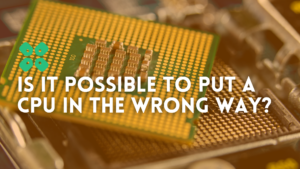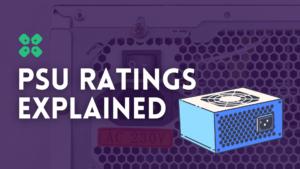You might be looking/hearing clock speed whenever a processor is discussed?
You might not know what it’s?
Or, you might be wondering what is over-clocking and under-clocking?
And, What is good for you?
Well, in this guide, I’ll be telling you all you need to know about CPU Clock Speed.
What’s Clock Speed?
Basic Definition: Clock rate or clock frequency at what CPU processor oscillates.
The processor in our CPUs has a built-in oscillator that completes an instruction cycle at a certain speed. This is known as clock speed and related to IPC (instructions per second). Processors are powerful nowadays, and their speed is usually told in MHz(MegaHertz)/GHz (GigaHertz).
1GHz processor can generate up to a billion pulses per second. On the technical side, a quartz crystal circuit determines the clock speed.
Why the term Clock Speed? Why not CPU speed?
Well, we can’t get its name changed now,
but, I can tell the reason behind it. As we measure most of the things against time and clock speed is measured in terms of seconds. So, it gets its name this way.
Secondly, clock speed doesn’t affect performance totally. It is one of the many measures that contribute to the overall speed. Doubling your clock speed might not have a great effect unless you change the rest of the hardware.
The clock speeds we are having commonly are enough as well, and the remaining hardware still barely copes up, as we don’t usually get an SSD with 4 billion writes per second, yet 4.0 GHz processors are becoming the new normal.
Other hardware tends to be a bottleneck in this case preventing our processor to be utilized fully when it needs tasks to be done by other hardware components.
Having said this, it stands true that you can get a performance upgrade if you overclock your CPUs, or you might get a better battery life by underclocking/undervolting.
Things are going to get interesting so keep reading.
Overclocking
It would be clear by its name that you would increase the base clock speed.
Now, if I can’t get my job done with the base speed and want to bring my processor to its maximum capability, increasing my processor’s clock speed would help me. Overclocking increases a CPU’s performance and you would be able to use that extra clock rate to play your favorite games.
You might be thinking why aren’t manufacturers providing processors with clock speeds less than what they are capable of?
This is due to the extra heat generated as it consumes extra resources, and your laptop would drain much sooner than you can expect. Additionally, it’s usually not beneficial for the hardware as it wears out and your processor might start to throw errors. When a processor is highly overclocked, it will behave in a reverse manner by underclocking itself to reduce heat generation.
You can reduce heat issues by undervolting your processor but that will not be of much help as you’d learn later in this post that it won’t be one of the best combinations to try with your processor.
Should I overclock my CPU?
It depends.
If your PC has proper vents to maintain CPU temperature, and your workload isn’t being fulfilled at the base speed, then you might need to overclock.
It’s not recommended in cases where you’re doing it to just gain extra speed while you don’t know where to use it. An overclocked CPU’s warranty might not be claimed and possibly cause heat damage.
Under Clocking
Underclocking is clocking down the processor to a lower speed that remains usable.
CPUs use less power and generate minimum heat in an underclocked state. Using less power means your laptop would have longer battery life. You can improve battery life in a better way as undervolting seems to be a better choice that’s explained in the next section.
Similarly, if you use a desktop, it will use less electricity. Perks of underclocked CPUs are:
- cooler devices
- no fan noise
while you won’t get the optimal performance that may not be needed in your case.
Should I under-clock my CPU?
Underclocked processors are mainly used by server administrators. Some servers don’t require the maximum performance and they underclock to conserve power generating lesser heat.
If you have a similar situation where you don’t the maximum performance from your computer, then you are good to go.
What’s Undervolting? Is Undervolting & Underclocking the same?
Undervolting directly relates to your power usage and doesn’t directly affect your processor’s clock rate. An undervolt processor would consume less power, and you don’t need to have a lower clock speed for it.
Undervolting can be done along with underclocking. It’s not recommended as you are not giving enough resources to your processor, an result in a much lower CPU speed.
Undervolting conserves power while increasing your battery life.
Is clock speed the only way to measure CPU performance?
Clock speed is one of the main ways to understand how fast your processor is, but there are more factors as well.
As the processor is dependant on other components/factors, it’s clear that clock speed is not the only measure.
When you buy your CPU, different factors need to be kept in mind as well.
Firstly, clock speeds are for each core, so if you have a single 4.0 GHz or a Quadcore 3.0 GH. You’d likely go for the latter as 4 different cores are working at 3.0GHz.
Bus speed is the speed at which our processor and other peripheral communicate. A higher bus speed means robust speeds.
Other well-known components like your RAM and SSD play a very vital role, and these all often become a bottleneck.
Summing up
The clock speed cannot be taken at face value.
You need to look at options and all the metrics told when choosing your CPU. A multi-core CPU with reasonable clock speed, a higher bus speed, faster RAMs & SSDs will be far efficient than a single processor with high clock speed.







